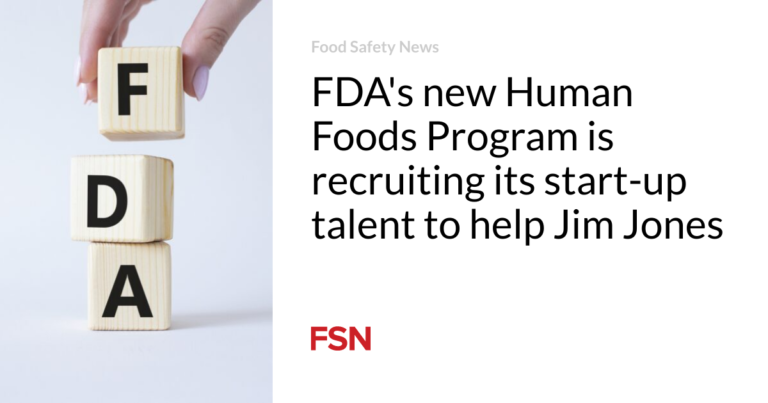What needs to be done before the Human Food Program (HFP) is launched on October 1, 2020? Of course, recruiting is necessary. Jim Jones, who joined the U.S. Food and Drug Administration (FDA) in September 2023 as the first Deputy Commissioner for Human Food, cannot do the job alone.
Jones is responsible for the birth of the unified Human Food Program (HFP) and must assemble a new HFP team.
FDA is focused on transforming into a more efficient, agile and future-ready agency as the industries it regulates continue to change and become more complex, including the emergence of new food technologies, the effects of globalization, climate change and other factors that require FDA to quickly adapt to an evolving world.
In January 2023, the FDA announced that after careful consideration of the findings and recommendations of the external evaluation by the Reagan-Udall Foundation, it would develop a reorganization proposal to create a unified human food program and reorganize its field operations (Office of Regulatory Affairs).
The FDA completed its proposed reorganization package in December 2023. After going through the formal external review process required for all federal reorganizations, the FDA received approval of the reorganization package in May 2024. The reorganization is now considered final, and the FDA plans to implement the reorganization on October 1, 2024.
FDA is recruiting throughout August for top Human Food Program positions, including a “super office director” for HFP’s Office of Food Chemical Safety and Dietary Supplements and Innovation. It is also seeking a “super office director” for HFP’s Office of Microbiological Food Safety. Other “super office directors” are needed in the Office of Laboratory Operations and Applied Sciences, the Office of Compliance and Enforcement, the Office of Policy and International Engagement, and the Nutrition Center of Excellence.
These new hires will transform the currently approved reorganization from mere paperwork into reality. The creation of a unified Human Food Program (HFP), adoption of a new model of field operations, and other important modernization efforts are among the most significant changes to occur at FDA in the coming decades.
The reorganization, which is just weeks away from taking effect, will significantly strengthen the FDA’s ability to monitor and protect the human food supply and other products it regulates.
The new HFP reports “a continuing demand for qualified individuals with backgrounds in biology, microbiology, chemistry, toxicology, other health-related sciences, data science, food safety, nutrition, health policy, health communications, regulatory advisory and other professional and management fields.”
This reorganization realigns functions of the Center for Food Safety and Applied Nutrition (CFSAN), the Office of Food Policy Response (OFPR), and key functions of the Office of Regulatory Affairs (ORA) into a single program, establishing the HFP.
In addition to the HFP listing, CFSAN opportunities will be listed until October 1, 2024.
youUnder the 21st Century Cures Act, enacted on December 13, 2016, and Section 3072 of the Act, the Commissioner of Food and Drugs has the authority to appoint highly qualified candidates to scientific, technical, or professional positions supporting the development, review, and regulation of pharmaceutical products, and to set annual salary amounts.
The FY23 Omnibus Food and Drug Reform Act expanded this authority, further amending Title 21 to include cross-disciplinary operational positions and individuals that support the development, review, and regulation of foods, cosmetics, and drugs (codified in Title 21 of the United States Code (21 U.S. Code 379d-3a)).
(Click here to sign up for a free subscription to Food Safety News.)



